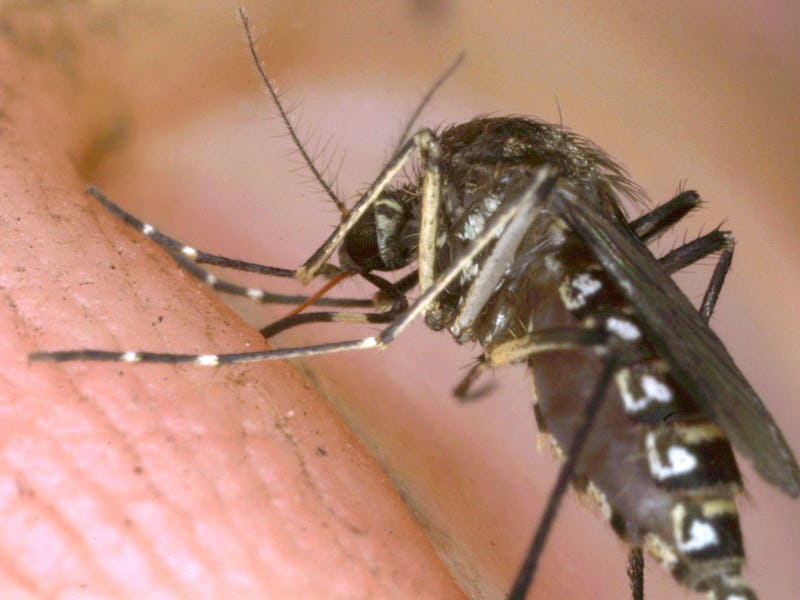How Do You Stop Mosquitoes? Hack Their Immune Systems
This could save millions of lives.

With all due respect to plague rats, mosquitoes are the most infamous disease carriers on the planet. Their bite transmits deadly infections including malaria, yellow fever, West Nile virus, dengue fever, and the Zika virus. The World Health Organization estimates mosquitoes are responsible for millions of deaths and hundreds of millions of cases each year, which makes controlling these pests one of the biggest, most important public health challenges in the world today.
Pesticides are an obvious way to reduce mosquito populations, but we’re running into the same problem here that we have with antibiotic-resistant bacteria. Yes, pesticides will wipe out some of the mosquitoes, but those that survive will have naturally tougher immune systems capable of resisting the pesticides. They will pass on their resistance to their offspring, which means pesticides become less and less effective with each generation. This is survival of the fittest at its most basic. Worse, spraying more pesticide to compensate for the mosquitoes’ resistance just damages the environment. Using a bacteria-based “biopesticide” can help, but even that can do damage to the environment if sprayed at high enough levels.
Now researchers at Belgium’s University of Leuven are working on an ingenious way to essentially hack the mosquitoes’ immune system and reduce their resistance. In the wild, insects like the backswimmer emit chemical signals that mosquitoes can sense to let them know predators are near. This creates a stress response that ultimately weakens the mosquitoes’ pesticide resistance.
“Organisms react to possible predation (when sensing predator cues) with a flight or fight response, or they keep as immobile as possible to not get the attention of the predator,” University of Leuven researcher Lin Op de Beeck tells Inverse. She explains that these chemical responses cause mosquitoes to expend energy, and avoiding predators often doesn’t leave adequate time to find food. “This will all result in less energy available, therefore all energy will go to sustaining basal functions of the metabolism and making sure not to get eaten.”
Op de Beeck says the complex molecules that comprise the insect’s immune system are some of the most energy-intensive to produce, so forcing mosquitoes’ energy elsewhere will quickly compromise their resistance. Scientists recently figured out how to create artificial predator cues, and now Op de Beeck has combined these synthetic cues with the biopesticide Bti, creating a potentially powerful new weapon against mosquitoes.
Carlos Varas, a Miami-Dade County mosquito control inspector, uses a Golden Eagle blower to spray pesticide to kill mosquitos in the Miami Beach neighborhood as the county fights to control the Zika virus outbreak on August 24.
The results from a laboratory experiment were promising. The predator cues so weakened the mosquitoes’ resistance that even a non-lethal dose of Bti had high mortality rates. The mosquitoes that did survive had permanently compromised immune systems, meaning they were less likely to live long enough to sustain the parasites they carried through their incubation periods.
But could mosquito populations become resistant to a cocktail of Bti and synthetic predator cues just as they have with other pesticides? This is where natural selection now works in our favor, according to Op de Beeck. “Gaining resistance to synthetic/natural predator cues is very maladaptive because, when sensing a predator, prey species should be alert not to get eaten,” she tells Inverse. “Therefore getting resistant to predator cues will likely not happen.”
In other words, predator cues still serve a crucial purpose in avoiding, well, predators. Mosquitoes that are naturally resistant to predator cues might do better when coming into contact with this souped-up pesticide, but they are also much likelier to get eaten by a backswimmer long before then. As an added bonus, using predator cues means we could spray much lower doses of the biopesticides, which would reduce the pressure on mosquito populations to adapt and slow down the evolution of resistance to the biopesticides.
It’s time to test it in the wild
The next step will be for the researchers to take their cocktail out of the laboratory and into the wild. While these preliminary results in the laboratory are promising, that doesn’t guarantee the pesticide will be as successful in nature, where lots of different factors — such as food availability and temperature — can influence how well pesticides work. Op de Beeck is optimistic her team is on the right track toward finding a better, more environmentally friendly pesticide.
“It is important with the rising concerns about Bti to invest in creating new strategies that could lead to a more efficient and more sustainable use of this biological pesticide in the long term, because it is such a good alternative to chemical pesticides,” she says. “And the combination with synthetic predator cues seems to be a very promising way to go forward, because they increase the toxicity of Bti and impair the mosquito immune system.”
If she’s right, the public health benefits could be incalculable. Well, that’s not strictly true — but the calculations would have to begin in the millions of lives.